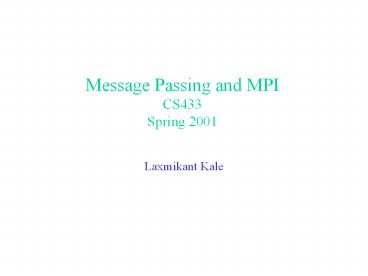Message Passing and MPI CS433 Spring 2001 - PowerPoint PPT Presentation
Title:
Message Passing and MPI CS433 Spring 2001
Description:
All processors execute essentially the same program, and same steps, but not in lockstep. All communication is almost in lockstep. Collective calls: ... – PowerPoint PPT presentation
Number of Views:61
Avg rating:3.0/5.0
Title: Message Passing and MPI CS433 Spring 2001
1
Message Passing and MPICS433Spring 2001
- Laxmikant Kale
2
Message Passing
send
receive
copy
data
data
PE0
PE1
3
Basic Message Passing
- We will describe a hypothetical message passing
system, - with just a few calls that define the model
- Later, we will look at real message passing
models (e.g. MPI), with a more complex sets of
calls - Basic calls
- send(int proc, int tag, int size, char buf)
- recv(int proc, int tag, int size, char buf)
- Recv may return the actual number of bytes
received in some systems - tag and proc may be wildcarded in a recv
- recv(ANY, ANY, 1000, buf)
- broadcast
- Other global operations (reductions)
4
Pi with message passing
Int count, c1 main() Seed s
makeSeed(myProcessor) for (I0 Ilt100000/P
I) x random(s) y random(s)
if (xx yy lt 1.0) count send(0,1,4,
count)
5
Pi with message passing
if (myProcessorNum() 0) for (I0
IltmaxProcessors() I) recv(I,1,4,
c) count c printf(pif\n,
4count/100000) / end function main /
6
Collective calls
- Message passing is often, but not always, used
for SPMD style of programming - SPMD Single process multiple data
- All processors execute essentially the same
program, and same steps, but not in lockstep - All communication is almost in lockstep
- Collective calls
- global reductions (such as max or sum)
- syncBroadcast (often just called broadcast)
- syncBroadcast(whoAmI, dataSize, dataBuffer)
- whoAmI sender or receiver
7
Standardization of message passing
- Historically
- nxlib (On Intel hypercubes)
- ncube variants
- PVM
- Everyone had their own variants
- MPI standard
- Vendors, ISVs, and academics got together
- with the intent of standardizing current practice
- Ended up with a large standard
- Popular, due to vendor support
- Support for
- communicators avoiding tag conflicts, ..
- Data types
- ..
8
Basic MPI calls
- MPI_Init(argc, argv) MPI_Finalize()
- MPI_Comm_rank(MPI_COM_WORLD, my_rank)
- my_rank is an int. (what is my processors serial
number) - MPI_Comm_size(MPI_COM_WORLD, P)
- P is an int. Total number of processors
(processes) - MPI_Send(m, size, MPI_CHAR, dest, tag,
MPI_COMM_WORLD) - MPI_Recv(m, size, MPI_CHAR, source, tag,
MPI_COMM_WORLD, status) - m is a char, while size, tag, and status are
ints - These 6 calls suffice to write many parallel
programs!
9
include ltstdio.hgt include mpi.h define MPIW
MPI_COMM_WORLD main(int argc, char argv)
int me, P, size, tag char buf10 hello
MPI_Init(argc,argv) MPI_Comm_rank(MPIW,
me) MPI_Comm_size(MPIW, P) if (me ! 0)
MPI_Recv(buf, strlen(buf)1, MPI_CHAR,
me-1, 5, MPIW, status) printf(s from
process d\n, buf, me) if (me lt P-1)
MPI_Send(buf, strlen(buf)1, MPI_CHAR, me1, 5,
MPIW) MPI_Finalize()
A Simple MPI program
10
Review Basic MPI calls
- MPI_Init(argc, argv) MPI_Finalize()
- MPI_Comm_rank(MPI_COM_WORLD, my_rank)
- my_rank is an int. (what is my processors serial
number) - MPI_Comm_size(MPI_COM_WORLD, P)
- P is an int. Total number of processors
(processes) - MPI_Send(m, size, MPI_CHAR, dest, tag,
MPI_COMM_WORLD) - MPI_Recv(m, size, MPI_CHAR, source, tag,
MPI_COMM_WORLD, status) - m is a char, while size, tag, and status are
ints - These 6 calls suffice to write many parallel
programs!
So, what is MPI_CHAR and MPI_COMM_WORLD? Does it
support other data types? Yes. Other worlds?
Well. other communicators which are partitions
of this
11
MPI collective communications
- Reductions and Broadcasts
- MPI_Bcast(msg, size, datatype, root,
communicator) - Note all processes must call this, including the
root. - It is an implicit send by the root, Recv by the
others - MPI_Reduce(data, result, size, type, op, root,
comm) - data, result are pointers, op specifies operation
(sum, max, min..) - count is the number of data items (not bytes)
- MPI_Barrier(Comm)
- MPI_Gather
- collect data from everyone in one place
- MPI_Scatter
- reverse































